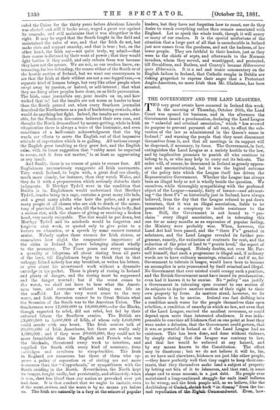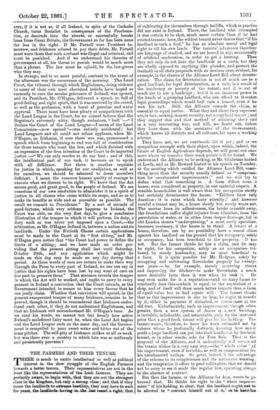THE GOVERNMENT AND THE LAND LEAGUERS.
TWO very great events have occurred in Ireland this week. In the morning of Thursday, October 20th, the Land Court was opened for business, and in the afternoon the Government issued a proclamation, declaring the Land League an " unlawful and criminal association," which " has avowed its purpose to prevent payment of all rent, to effect the sub- version of the law as administered in the Queen's name in Ireland ;" and warning the people that they must disconnect themselves from it, and that all meetings in its support will be dispersed, if necessary, by force. The Government, in fact, extinguishes the Land League as a society hostile to the law, and by implication promises to punish all who continue to belong to it, or who may help to carry out its behests. The order will, of course, be denounced in Ireland as grossly oppres- sive and unconstitutional, but it was the logical outcome of the policy into which the League itself has driven the Representative Government. Whether the League has always been an illegal body or not is wholly beside the question. We ourselves, while thoroughly sympathising with the professed object of the League—namely, fixity of tenure—and advocat- ing "the three F's" as historically just in Ireland, have always believed, from the day that the League refused to put down terrorism, that it was an illegal association, liable to be prosecuted for a conspiracy to incite resistance to the law. Still, the Government is not bound to " pro- claim " every illegal association, and in tolerating this one for so many months as an expression of popular feeling, the Ministry were probably wise. When, however, the Land Act had been passed, and the " three F's " granted in substance, and the Land League revealed its further pro- gramme, namely, the extinction of contracts for rent, and the reduction of the price of land to "prairie level," the aspect of affairs entirely changed. Nobody doubts, not even Mr. Par- nell himself, that such a programme is illegal and, if ordinary words are to have ordinary meanings, criminal ; and if so, for Government to tolerate it longer, would have been to become an accomplice in acts pronounced by itself criminal and illegal. No Government that ever existed could occupy such a position, and the British Government must have issued its proclamation, even had it known it to be-unwise. No " policy " can justify a Government in tolerating open counsel to one section of its subjects to deprive another section of their -right to their own property by force. As matters stand, however, we do not believe it to be unwise. Ireland was fast drifting into a condition much worse for the people themselves than open rebellion, a condition of anarchy in which no law, not even that of the Land League, excited the smallest reverence, or could depend upon more than interested obedience. It was indis- pensable to convince all Irishmen that on one point at least they were under a delusion, that the Government could govern, that it was as powerful in Ireland as if the Land League had no existence. This has been done, and done without violence, by simply stating that the League was contrary to law, and that -law would be enforced at any hazard, and by any means known to Ithe Constitution. The effect may be disastrous ; but we do not believe it will be, for, as we have said elsewhere, Irishmen are just like other people, —they know perfectly wall that they ought to keep their con- tracts, that they themselves make land• a subject of property by letting out bits of it to labourers, and that rent, in some shape and to some amount, is a .just debt. No:people ever maintained a long-continuedatruggle .for- ends itself believes to be wrong, an&-the Irish, people will, as we believe,-like the Archbishop of Cashel,.ahrink.badk "in dismay "irons the for- mal repudiation of .the.Pghtli-Demsaaluitaont. Even, how-
ever, if it is not so, if all Ireland, in spite of the Catholic Church, turns Socialist in consequence of the Proclama- tion, or descends into the streets, or successfully breaks loose from Great Britain, the Government so far has been none the less in the right. If Mr. Parnell were President to- morrow, and Irishmen refused to pay their debts, Mr. Parnell must warn them that such a refusal was illegal and criminal, and must be punished. And if we understand his theories of government at all, his threat to punish would be much more than a phrase. The law must be upheld, be the law-givers who they may.
In strange, and to us most painful, contrast to the event of the afternoon was the occurrence of the morning. The Land Court, the tribunal through which Englishmen, doing violence to many of their own most cherished beliefs, have hoped so earnestly to cure the secular grievance of Ireland, was opened, and its President, Mr. O'Hagan, delivered a speech so full of good-feeling and right spirit, that it was received by the crowd, as well as the profession, with a burst of genuine and warm approval. There must have been plenty of sympathisers with the Land League in the Court, for we cannot believe that the Registrar's extremely witty, though audacious, " bull "—" I declare the Court of the Land League—I mean of the Land Commission—now opened "—was entirely accidental ; but Land Leaguers and all could not refuse applause, when Mr. O'Hagan, an Irishman, if ever there was one, pronounced a speech which from beginning to end was full of consideration for those tenants who trust the law, and which finished with an expression of the firm intention of the Court to do impartial justice :—" We can only resolve to do our best ; and of this, the intellectual part of our task, it becomes us to speak with all diffidence. But there is another requisite for justice in which, speaking for our coadjutors, as well. as for ourselves, we should be ashamed to deem ourselves deficient. I mean the common human quality of courage to execute what we discern to be right. We know that the Act means good, and great good, to the people of Ireland. We are conscious of our own resolution to administer it in a spirit of justice to all classes who come within its scope, and so as to make its benefits as wide and as accessible as possible. The result we commit to Providence." By a sort of miracle of good-fortune, which very seldoms happens to Ireland, the Court was able, on the very first day, to give a conclusive illustration of the temper in which it will perform its duty, a duty such as was never yet imposed upon a Court,—the arbitration, as Mr. O'Hagan defined it, between a nation anclits landlords. Under the Sixtieth Clause certain applications must be made to the Court at its " first sitting," and-'Mr. O'Hagan gave notice that "the Court had power to define the limits of a sitting ; and we have made an order pro- viding that the present sitting shall last until Saturday, October 29th, and any application which might be made on this day may be made on any day during that period. As these words of ours are certain to make their way through the Press to every part of Ireland, no one can say in justice that his rights have been lost by any want of care on our part to preserve them." That sentence reveals the temper in which the Act will be worked, and ought to carry to every peasant in Ireland a conviction that the Court intends, as the Government intended, to secure to him every favour that he can justly claim. Whether that conviction will spread, in the present exasperated temper of many Irishmen, remains to be proved, though it should be remembered that Irishmen under- stand each other, if they do not understand Englishmen, and that no Irishman will misunderstand Mr. O'Hagan's tone. As we read his words, we cannot but feel keenly how active Ireland's maleficent fairy must be, when the Land Act begins and the Land League ends on the same day, and the Govern- ment is compelled to pour sweet water and bitter out of the same pitcher. The self-pity of Irishmen strikes us all as weak, but was there ever a country in which fate was so uniformly and persistently perverse I



































 Previous page
Previous page